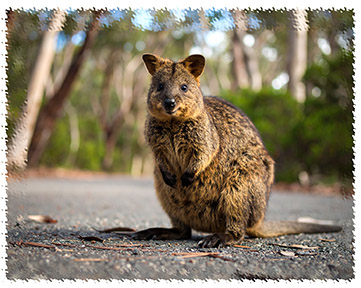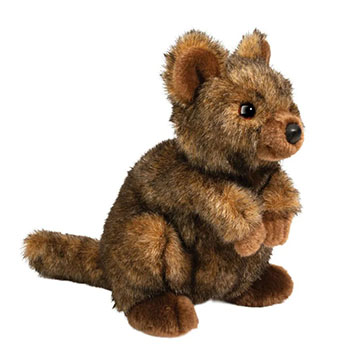

The Quokka, Setonix brachyurus, is another unusual mammal from Australia.
This marsupial is in the macropod family, similar to the wallaby. Macropod means "big foot". This nocturnal herbivore enjoys a variety of vegetation such as grasses, sedges and leaves. It sleeps during the day in a plant called Acanthocarpus preissii or Prickle Lily, using the plants spikes for protection and hiding from predators, which include the dingo, red foxes and feral cats. The plant is native to Australia and thrives in the arid interior.
The quokka looks like a very small kangaroo; it can climb small trees and shrubs up to about 5 feet. Its coarse fur is a grizzled brown color, fading to buff underneath. A quokka weighs 5 to 10 pounds and is 16 to 21 inches long with a 9 to 12 inch tail, which is quite short for a macropod. It has a stocky build, well developed hind legs, rounded ears, and a short, broad head. It also seems to have a perpetual smile.
Quokka females have a month-long gestation, then give birth to a single baby called a joey. Females can give birth twice a year. The joey lives in its mother's pouch for six months. Upon leaving the pouch, the joey relies on its mother for milk for two more months. It is fully weaned around eight months after birth. Females sexually mature after roughly 18 months. When a female quokka with a joey in her pouch is pursued by a predator, she may drop her baby onto the ground; the joey produces noises which may serve to attract the predator's attention, while the mother escapes.
A large population of quokkas exists on Rottnest Island and a smaller population is on Bald Island. These islands are free of the typical Quokka predators. On Rottnest, quokkas are endemic and occupy habitats ranging from semiarid scrub to cultivated gardens. Prickly Acanthocarpus plants provide their favourite daytime shelter for sleeping. Additionally, quokkas are known for their ability to climb trees.
On the mainland, quokkas prefer areas with more vegetation, both for a wider variety of food and also for cover from predators.
The quokka lifespan is about 10 years. Due to their declining numbers, it is against the law in Australia to feed or handle them. Anyone caught touching a quokka will be slapped with a hefty fine.
The plush toy Quokka shown above is made by Douglas. Find it at our sponsor's online gift shop: www.jeanniescottage.com.




